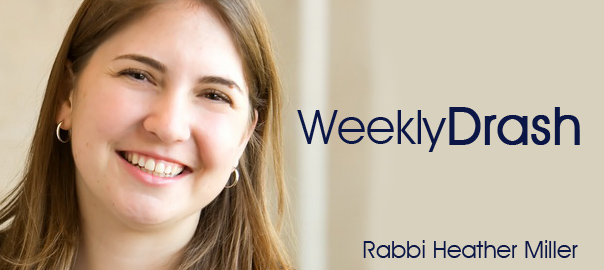Weekly Drash: Parashat T’tzavveh Exodus 27:30-30:10

By Rabbi Heather Miller
In the fourth century, BCE, in his work, De Anima, the great philosopher Aristotle wrote of the tabula rasa— the blank slate. It was a theory that each individual entered into the world as a blank canvas- not directed onto any particular path.
But, with time, each individual is brought into society, taught rules, laws, order, standards and responsibilities. We are taught culture and taught what of ourselves to hide and what of ourselves to reveal.
It reminds me of the image in this week’s Torah portion, Tetzaveh, where we learn about the many many layers of clothing that Aaron and the priests were instructed to wear. With each piece, I think of the weight of responsibility that they had on their shoulders– adorned in gold, crimson and blue, they were layered with breastplates and shoulder cloths, head-dresses and breeches and robes and tunics and pomegranate shaped bells and sashes. These leaders were literally and metaphorically weighted down by the strictures of culture.
That’s what social mores can feel like. Great weights that contrast against and constrict our “true selves.”
To reveal who we really are, especially if what we are may contrast with what society deems is “proper,” is daring.
This week, when we read the Megillah on Purim, we recount the heroic tale of Esther. We learn that King Ahashverosh married her without knowing her true identity– that she was a Jew. She hid her identity under layers and layers of social norms– but finally decided to reveal herself when a decree to slaughter all Jews was declared by the wicked Haman.
Queen Esther is celebrated for her coming out– her revealing of her true Jewish identity- and consequently, for saving the Jewish people across the Persian Empire through that revelation.
Those of us who are Gay, Lesbian, Bisexual or Transgendered in the United States today viscerally know the courage it takes to reveal a part of ourselves that society would often prefer to cover up. As Jews in America, too, we sense what this is like.
We share our coming out stories– like the time that I was in Huntsville, Alabama at space camp and shared that I was Jewish much to the surprise of my Southern camp counselors who told me that they had never knowingly met a Jew before. Or the time when I came out to a priest that I had met in Orange County– we were doing some work together against the death penalty, I spoke not only philosophically about Prop. 8, but about the very real consequences it would have on me and my partner.
There is another otherwise invisible identity that is often taboo, and a group that is suffering because of society’s collective difficulty with it- those who have invisible disabilities.
I first became aware of the concept of “invisible disabilities” in college– I worked with a group who was advocating for a full-time Director of Disability Services on campus. Over the course of our time working together, various members of the group who I assumed were healthy, actually revealed their chronic (but otherwise invisible) illnesses to me. HIV, Lupus, MS– the reason why these disabilities are invisible is because they are chronic and have no outward physical markers– and when people are suffering rounds of them, they stay home or are checked into a hospital– no one knows that they are suffering. Consequently, they are often battling their disease in isolation and in silence.
As I awakened to their plights, I, realized that I, too, was one of them. I had grown up with serious medical issues, serious medical conditions beginning with a large benign tumor on my left ovary when I was 9– later, I was diagnosed with asthma and later I developed various problems with my lungs– even suffering from a collapse of my right middle lobe in 2002.
Over the years, I have found community in a group that calls ourselves “spoonies.” Spoonies are serious– some of us have bracelets and necklaces or tattoos of spoons. Why are we called spoonies?
It began with one woman named Christine who suffers from lupus. One day, she found herself attempting the impossible task of trying to explain to her friend what having a chronic illness was like. They were in a diner. And, then she figured out a way to do it. She grabbed every spoon on the table, and spoons off of the other tables as well. She handed the bouquet of 12 cold metal spoons to her friend and said, “Here you go, you have Lupus.” She then explained that, “the difference in being sick and being healthy is having to make choices or to consciously think about things when the rest of the world doesn’t have to. The healthy have the luxury of a life without choices, a gift most people take for granted.” The spoons would represent the energy that an individual has.
Christine then asked her friend to list off the tasks of her day, including the most simple. She rattled off daily chores, or just fun things to do; but as she did so, Christine explained how each one would cost her a spoon. When she jumped right into getting ready for work as her first task of the morning, Christine reminded– “No! You don’t just get up. You have to crack open your eyes, and then realize you are late. You didn’t sleep well the night before. You have to crawl out of bed, and then you have to make yourself something to eat before you can do anything else, because if you don’t, you can’t take your medicine, and if you don’t take your medicine you might as well give up all your spoons for today and for tomorrow, too.”
As the theoretical day continued, Christine quickly took spoon after spoon away– showering cost a spoon. Getting dressed was worth another spoon.
Needless to say, that even before a theoretical work day, her friend only had 6 more spoons. At that point, Christine then explained to her friend that she needed to choose the rest of her day wisely, since when your “spoons” are gone, they are gone. More spoons can’t just be generated.
At the end of the pretend day, Christine’s friend only had one spoon left– and here Christine explained a choice: if she cooked, she wouldn’t have enough energy to clean the pots. But if she went out for dinner, she might be too tired to drive home safely. If, for some reason, you have the rest of the night and end up with one spoon, you can do something fun, or clean your apartment, or do chores, but you can’t do it all (- Adapted from butyoudontlooksick.com).
This is a small taste of what it is like to have a chronic invisible illness on a normal day. Constant managing of energy “spoons”– and if one is sick, it is even worse– one has to allow for extra driving to doctors and to get medical tests and new prescriptions.
When working as a hospital chaplain at UCLA Medical Center and having been assigned to the chronic illness unit, I learned that the spiritually of people with chronic illness is sometimes about celebrating the little things– like a morning without symptoms. Or the hope of new treatments. But people with chronic illness also know the crushing weight of feeling like a burden upon those one loves.
Some of you here tonight may also live the secret life of chronic illness and other invisible disabilities. You are strong, you persevere, you see the long run, you get the irony of how chronic illness calls you to cherish each day even as you curse some days.
Many of you are deeply religious and feel gratitude for the mercy God has shown you because you feel that your existence is totally dependent upon the grace of God, while still some of you question and rage against a God could make an existence so cruel.
As we celebrate Purim and Esther’s coming out, and as we do so with particular sensitivity as an LGBT founded congregation, may we also create safe space for those with invisible disabilities. During this, the national Jewish Disability Awareness Month, may we each open up our hearts and minds to the experience of those with all kinds of disabilities and other identities that are often overlooked– like learning disabilities and addiction and mental disabilities– and let us see within the experiences of all people, a blessing. Amen.
By Rabbi Heather Miller for Beth Chayim Chadashim.
February 22, 2013






